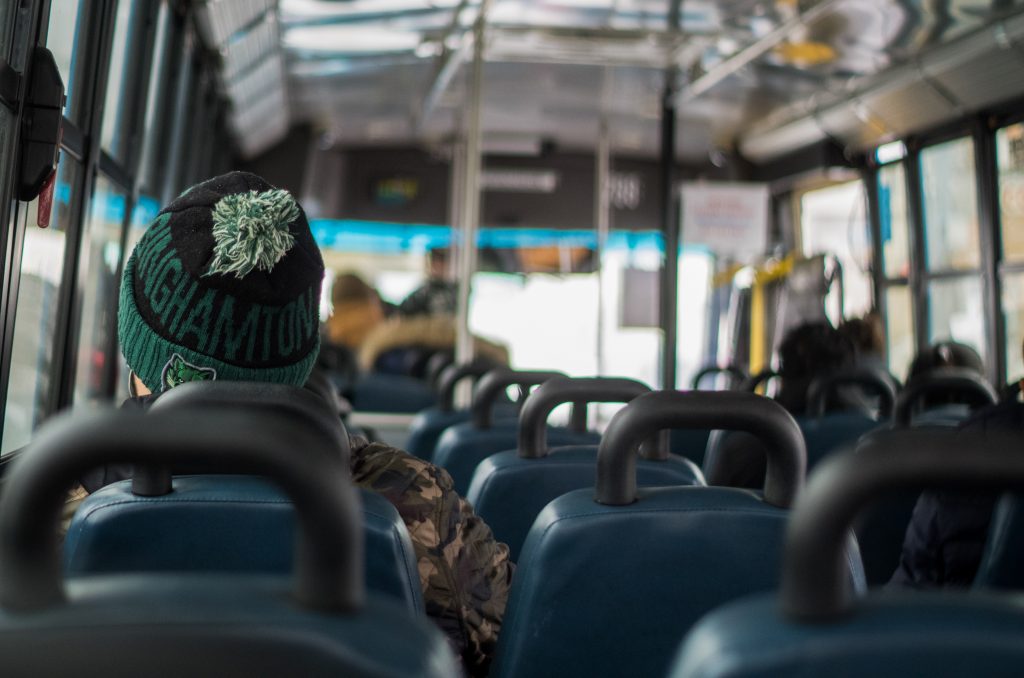
Binghamton University’s Off Campus College Transport (OCCT) may begin charging students for vomiting on the blue buses starting next academic year.
According to Glenell Jaquez, public relations coordinator for OCCT and a first-year graduate student studying accounting, the plan to charge students a cleaning fee is currently awaiting approval from Tanya Husick, executive director of transportation and parking services.
“We’ve been throwing this idea around because last semester was really bad with the vomiting,” Jaquez said. “It gets pretty crazy [Downtown] with students trying to come back to campus, but the thing is — just because one person vomited on the bus — we have to take the entire bus out of service for the rest of the night to get it cleaned.”
When OCCT switches out a dirty bus, there is only a certain number of buses available to replace it. If multiple buses experience a biohazard — the term used for incidents such as vomit — then there will not be enough buses on route to service the number of students in need of a ride home at the end of the night.
“That’s where the theory came in, that if we charge people then they’ll be more careful not to vomit on the bus — maybe they’ll take care of business before getting on,” Jaquez said. “It’s more of a scare tactic, if anything, to avoid people vomiting on the bus. It’s a little unfair just because you took yourself to that level, and inflicted self-damage to yourself and now you’ve vomited, [and] now a few dozen students won’t be able to make it back to campus because of you.”
Gabriel Perez, a senior majoring in economics, said he is in favor of charging students a cleaning fee.
“The buses shouldn’t be a safe haven just because they don’t have the same consequences that cabs have,” Perez said. “I think it’s really great that the buses wanted to be seen as equal to the cabs, and have that same expectation of being paid for damages, like a student vomiting. Since part of OCCT’s funding comes from students’ fees, it’s not fair that everyone suffers when buses go offline because one person got sick.”
Funding for OCCT mostly comes from BU’s Student Association (SA) and Graduate Student Organization (GSO), via the mandatory activity fee included in every student’s semester bill. The SA allocates a minimum of $72,000 per academic year for OCCT, plus $20 per undergraduate student per semester, a total of roughly $620,000. The GSO allocates $22 full time equivalent graduate student per academic year. Currently, OCCT is undecided on the price of the potential vomiting fee.
Although the plan to begin charging students a cleaning fee has yet to be put into effect, in the past year, OCCT has hired a new cleaning crew to work throughout the week, including late nights, to combat buses being taken offline.
According to Jason Andrews, head mechanic for OCCT, other changes for the transportation company include a changing out of old buses for newer models. Andrews said OCCT retired two buses last semester and placed an order for three new buses for next year. After 15,000 hours of driving, typically an eight-year life span for the average OCCT bus, the engines reach their limit and the buses need replacing.
“We have a good turnover rate,” Jaquez said. “While we think that everything is going great, getting feedback from students is how we’ll be able to become a better company. The best way to get in contact with us is on our website or even on Twitter because we appreciate as much feedback as possible.”


